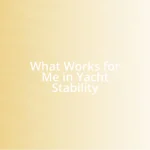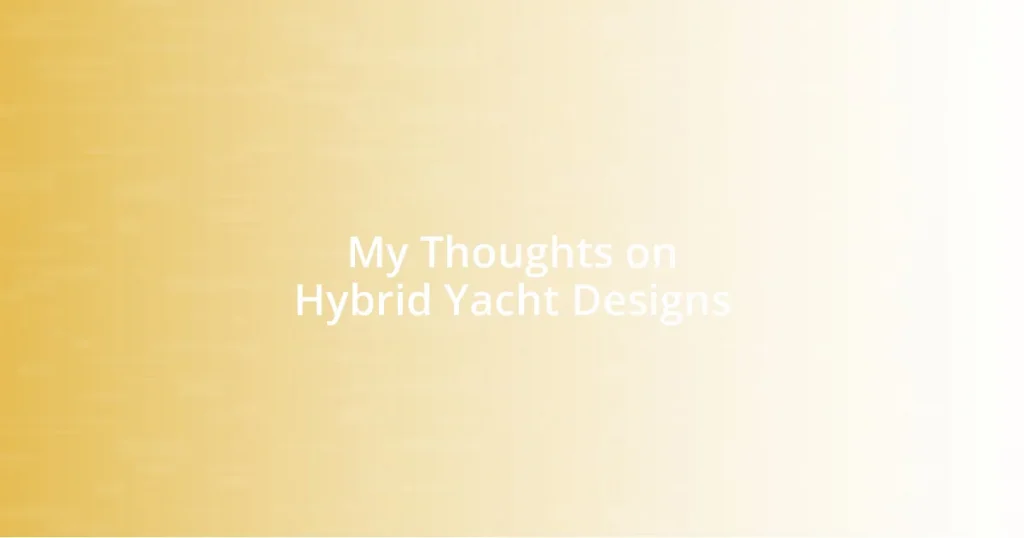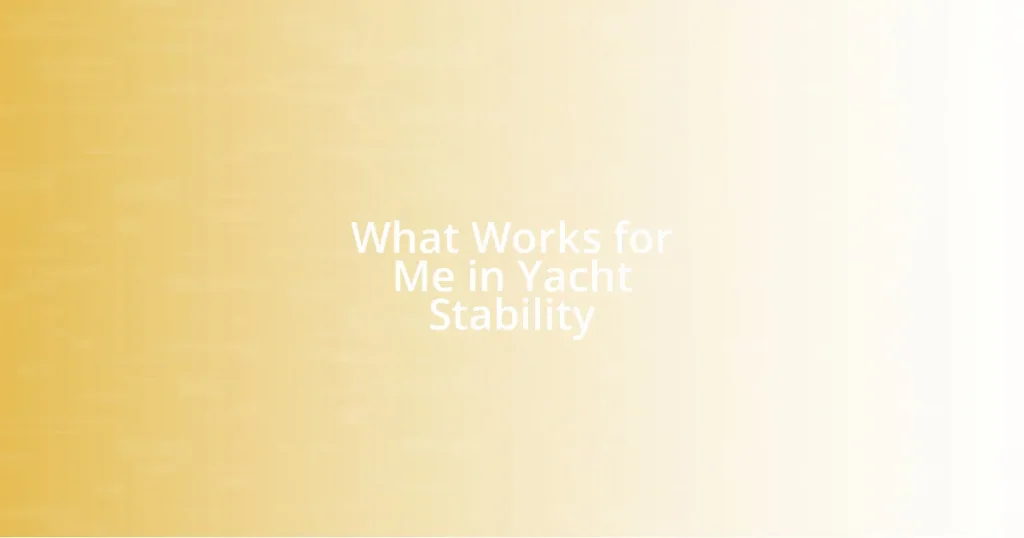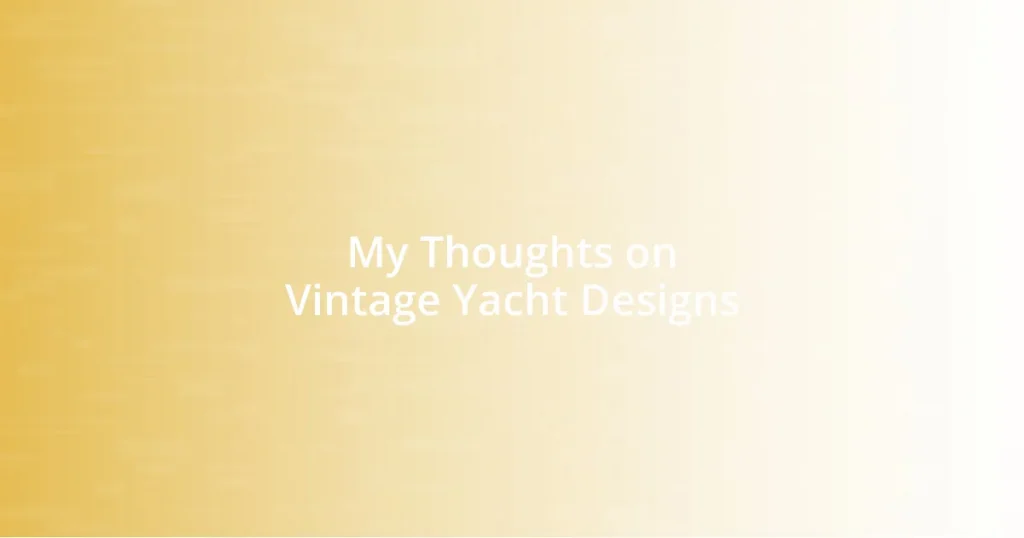Key takeaways:
- Hybrid yachts feature dual propulsion systems, combining internal combustion engines and electric motors, enhancing fuel efficiency and reducing emissions.
- Key benefits include quiet operation, reduced environmental impact, and advanced energy management systems that optimize performance based on conditions.
- Choosing the right engine involves balancing power with eco-friendliness, considering battery capacity, and selecting lighter engines for improved maneuverability.
- Future trends in hybrid yachting focus on sustainability with innovations like solar power integration, AI-driven navigation systems, and modular designs for customization.

Understanding Hybrid Yacht Features
One of the most striking features of hybrid yachts is their dual propulsion systems, commonly combining a traditional internal combustion engine with electric motors. This setup not only enhances fuel efficiency but also showcases a commitment to reducing emissions. I remember the first time I sailed on a hybrid yacht, marveling at how effortlessly it glided through the water with hardly a whisper of noise—can you imagine the serene experience of navigating pristine waters, all while reducing your environmental footprint?
Another standout feature is the advanced energy management systems. These systems intelligently switch between power sources, optimizing performance based on conditions like speed and weather. I’ve seen firsthand how these systems can extend cruising time—a game-changer for those long, leisurely trips where you want to stretch your time on the water. Isn’t it fascinating how technology evolves our experiences, allowing us to enjoy nature more sustainably?
Additionally, many hybrid yachts offer integrated solar panels, further enhancing energy efficiency. I’ve personally stood on deck as the sun powered the systems, feeling a sense of pride in knowing we were harnessing nature’s energy. This integration not only lessens the reliance on fossil fuels but also creates a more self-sufficient vessel. When was the last time you realized that your enjoyment of the ocean could benefit both you and the planet?
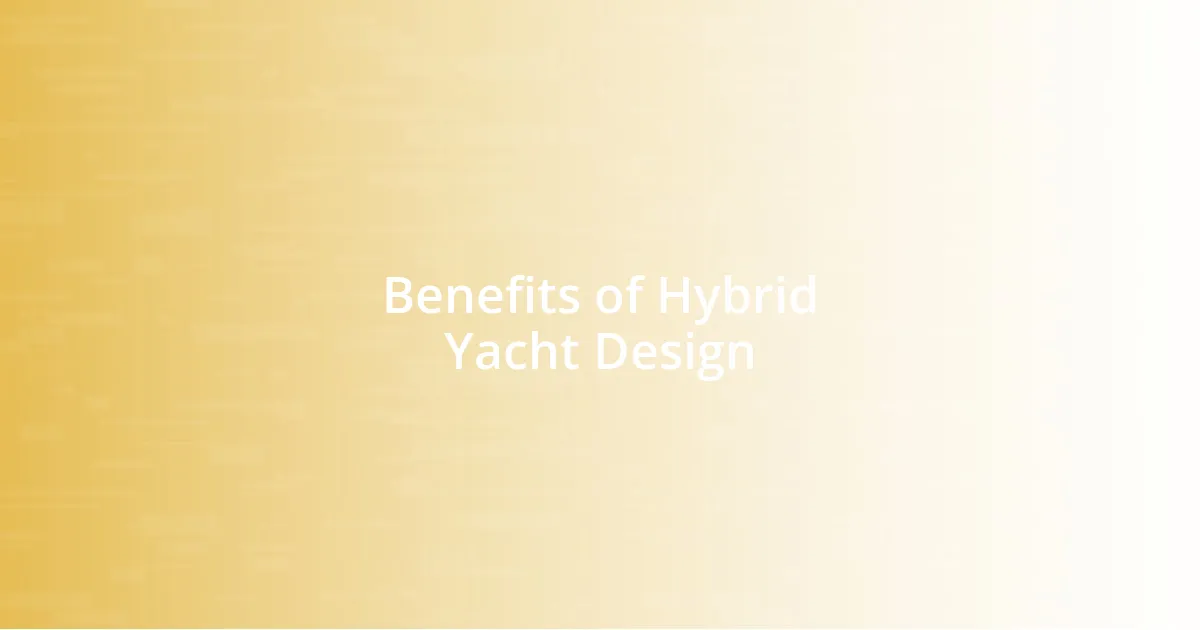
Benefits of Hybrid Yacht Design
Hybrid yacht designs come with a range of benefits that can truly enhance the overall experience of yachting. For instance, the ability to switch between electric and traditional propulsion allows for quieter, more serene outings. I’ll never forget the moment my friends and I realized just how peaceful it was to cruise along the coastline, enjoying waves lapping against the hull, without the usual noise of engines roaring. It creates a connection to nature that feels precious.
Here are some key benefits of hybrid yacht design:
– Reduced Emissions: Lower environmental impact through decreased fuel consumption.
– Enhanced Fuel Efficiency: Optimizes energy use, extending cruising range and time on the water.
– Quiet Operation: Provides a tranquil sailing experience by minimizing noise pollution.
– Sustainability: Integrated renewable energy sources, like solar panels, contribute to a self-sufficient system.
– Advanced Technology: Smart energy management systems adapt to external conditions, improving overall performance.

Considerations for Engine Selection
Choosing the right engine for a hybrid yacht is a crucial step that can impact performance, efficiency, and the overall sailing experience. I’ve often found myself pondering about the balance between power and eco-friendliness. For instance, a more robust traditional engine paired with an efficient electric motor can provide the best of both worlds, allowing for quick escapades when the need arises without sacrificing the commitment to sustainability. Have you ever felt the rush of speed as you maneuver through challenging waters? That exhilarating moment can be enhanced with the right engine combination.
Battery capacity is another key element when selecting an engine. I remember the time we set out for an afternoon of sailing, relying solely on the electric motor—and it almost felt magical gliding silently across the waves. However, our engine choice was meticulously planned; we ensured the battery packs offered enough capacity for our distance. I can’t emphasize enough how vital it is to assess your cruising needs realistically. After all, there’s nothing worse than being stranded in the middle of a gorgeous sunset, wishing you had chosen a different setup!
Lastly, the weight and size of the engine are paramount considerations. I once visited a hybrid yacht that featured a surprisingly compact engine, which contributed to its nimble handling and lower weight. This experience highlighted how a lighter engine can lead to enhanced maneuverability, especially in tight spaces or when docking. Are you imagining how the design can influence your sailing? The right engine selection can significantly transform your experience on the water.
| Engine Type | Advantages |
|---|---|
| Internal Combustion | Higher power output, suitability for long-range cruising. |
| Electric Motor | Quieter operation, lower emissions, and reduced fuel costs. |
| Hybrid System | Combines both strengths, allowing flexibility and optimal performance. |
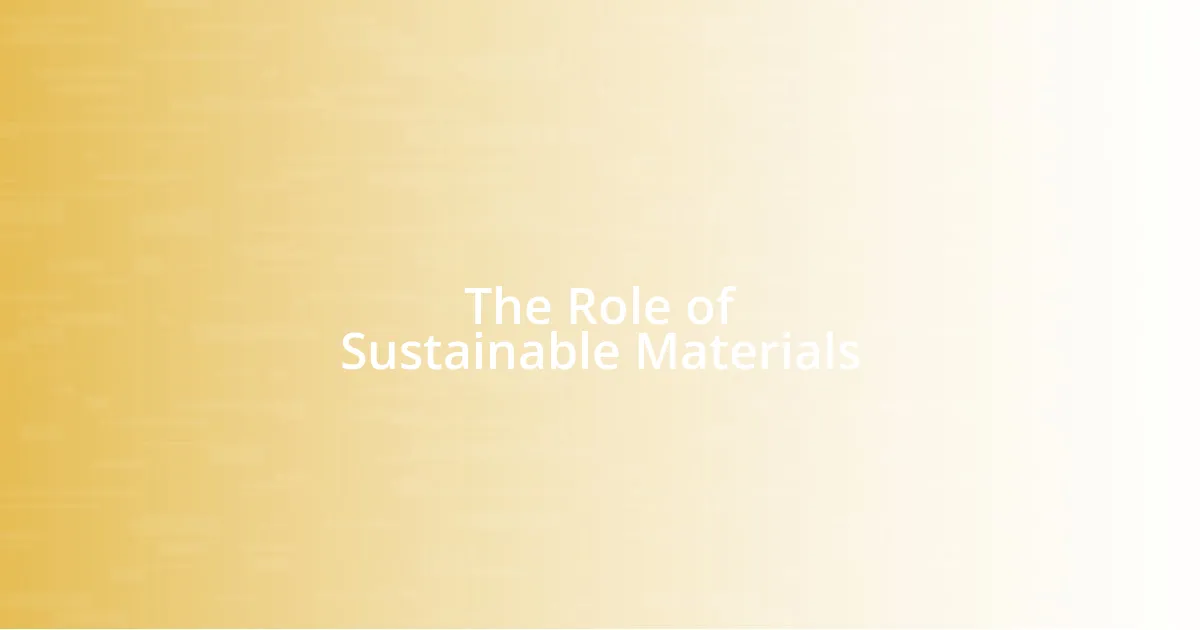
The Role of Sustainable Materials
Sustainable materials play an essential role in the evolution of hybrid yacht designs. I vividly recall my awe during a tour of a yacht constructed with bamboo and recycled plastic composites. It’s fascinating how using such materials not only reduces environmental impact but also creates a unique aesthetic. Have you ever run your hand along a beautifully finished wooden surface, knowing it came from renewable sources? That connection deepens appreciation for the craftsmanship behind sustainable designs.
In my experience, the choice of sails made from biodegradable fabrics can also significantly influence performance. Once, I sailed on a yacht with sails crafted from such materials, and the experience was truly gratifying. The knowledge that these sails would decompose and return to nature rather than polluting the ocean gave an entirely new meaning to responsible sailing. It makes you wonder—how much of our lifestyle can we alter to be better stewards of the sea?
Moreover, integrating sustainable materials fosters an innovative mindset among manufacturers. I’ve come across some hybrid yachts boasting solar power systems encased in eco-friendly composites, and it got me thinking about the endless possibilities. Wouldn’t it be incredible if every yacht could harness the sun while remaining committed to an eco-conscious design? This shift not only elevates the overall yachting experience but also sets a precedent for the industry to follow.
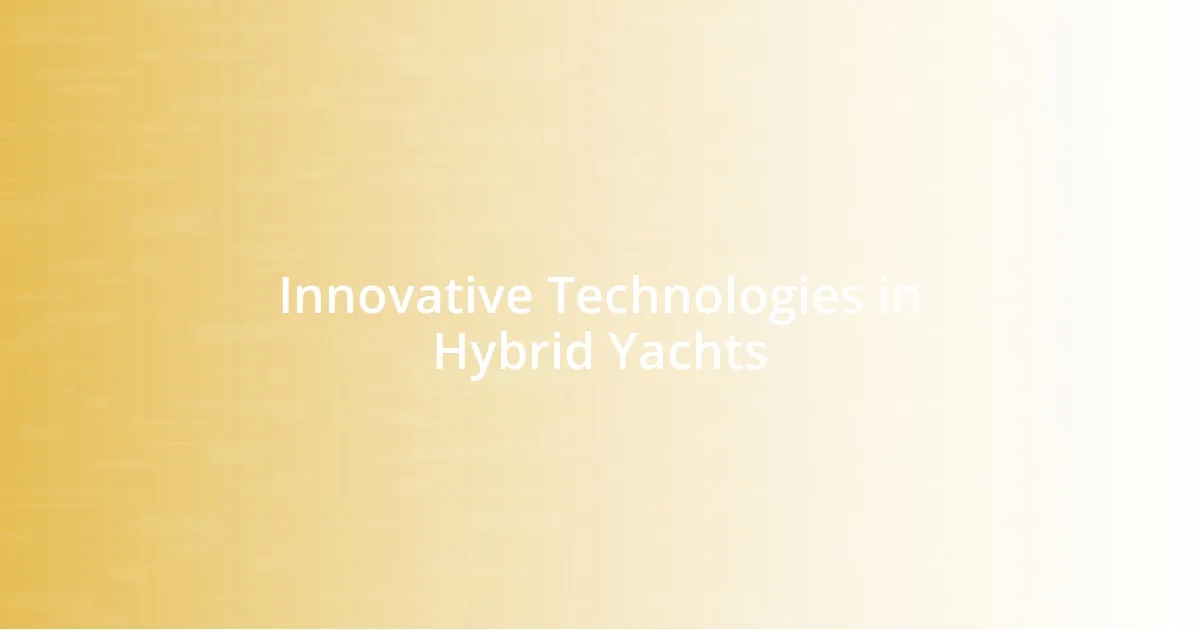
Innovative Technologies in Hybrid Yachts
Hybrid yachts are at the forefront of innovation, integrating advanced technologies like regenerative propulsion systems. I remember being captivated watching a yacht harness energy from the wind and water during a recent outing. Just imagine: as the yacht moves, it generates power back into the battery, reducing reliance on traditional fuel sources. It made me wonder how many other untapped technologies are out there, waiting to revolutionize our sailing experiences.
Another exciting development is the incorporation of smart systems for energy management. One of my sailing friends recently showcased a hybrid yacht equipped with a sophisticated monitoring system, allowing us to track battery levels, fuel consumption, and solar energy production all in real-time. This level of transparency not only enhances efficiency but also promotes mindful sailing, as we naturally became more aware of our resource usage. Have you experienced the ease of sailing while feeling fully in sync with the vessel? It’s honestly liberating.
Lastly, the rise of hybrid energy systems, combining multiple power sources, has chipped away at the complexities of yacht operation. I once sailed on a vessel that seamlessly switched between its diesel engine and electric motor, depending on the conditions. This versatility ensured we cruised quietly in crowded ports while still having the power to cut through rougher seas when needed. Isn’t it fascinating how technology can enhance safety and comfort? It’s a beautiful intersection of tradition and innovation, pushing the boundaries of what’s possible in yachting.

Expert Recommendations for Buyers
When considering a hybrid yacht purchase, it’s crucial to prioritize eco-conscious features. I remember the thrill of exploring a model with a dual propulsion system, allowing it to glide silently along the coastline. The experience left me pondering: why wouldn’t every discerning buyer want a vessel that minimizes its carbon footprint while enhancing the joy of sailing with nature?
I recommend asking for demonstrations of the yacht’s energy management systems. One time, in a test sail on a hybrid yacht equipped with real-time analytics, I felt empowered as I adjusted our course to maximize solar gains. It was a transformative moment that made sailing feel less like a luxury and more like a responsible choice. Engaging with these technologies firsthand can help buyers appreciate their long-term benefits and operational simplicity.
Lastly, don’t shy away from discussing customization options. I once met a yacht owner who creatively integrated a compact water desalinator into their hybrid design. This small addition not only ensured access to fresh water but also deepened their connection to sustainable living at sea. Might your dream yacht include unique features that reflect your values? Exploring these possibilities can make your purchasing journey as rewarding as the adventures ahead.

Future Trends in Hybrid Yachting
I see an exciting future for hybrid yachting that’s driven by sustainability and technology. Recently, I attended a boat show where a forward-thinking company unveiled a yacht designed to utilize solar panels seamlessly integrated into the deck. It struck me how such innovations could redefine eco-friendly cruising, allowing you to essentially sail on sunshine. It left me wondering, what if every yacht embraced the potential of renewable energy?
Moreover, I’m particularly intrigued by the move towards user-friendly interfaces that enhance the sailing experience. While at a marine exhibition, I encountered a hybrid yacht with an AI-driven navigation system. I could only marvel at how it adjusted sailing routes based on real-time weather and energy efficiency metrics. It made me think, how liberating would it be to have a yacht that not only sails itself but also teaches us something new about the waters we traverse?
Finally, I’m quite passionate about the emerging trend of modular designs in hybrid yachts. A friend of mine recently transformed an old fishing yacht into a hybrid masterpiece by incorporating detachable solar units and a retrofitted battery bank. This kind of adaptability is thrilling—imagine being able to customize your yacht for different voyages or personal preferences effortlessly. Could you envision having a yacht that adapts to your lifestyle while reflecting your commitment to the environment? It feels like this approach will not only enhance our connection to the ocean but also empower us to sail with purpose.
